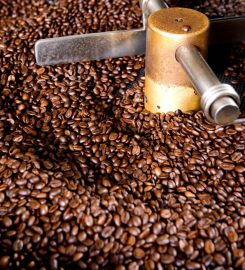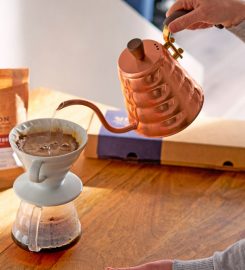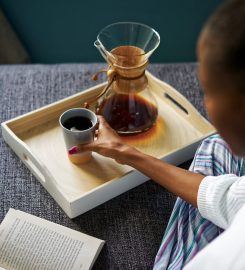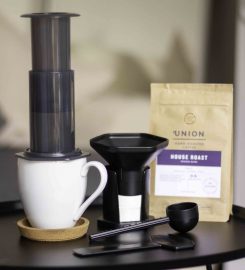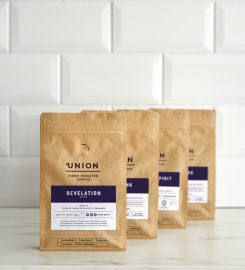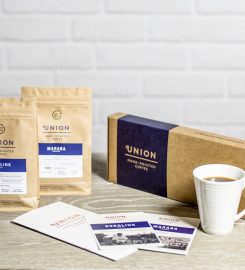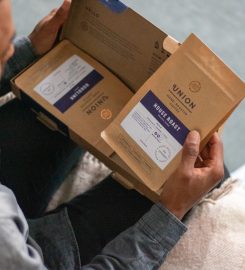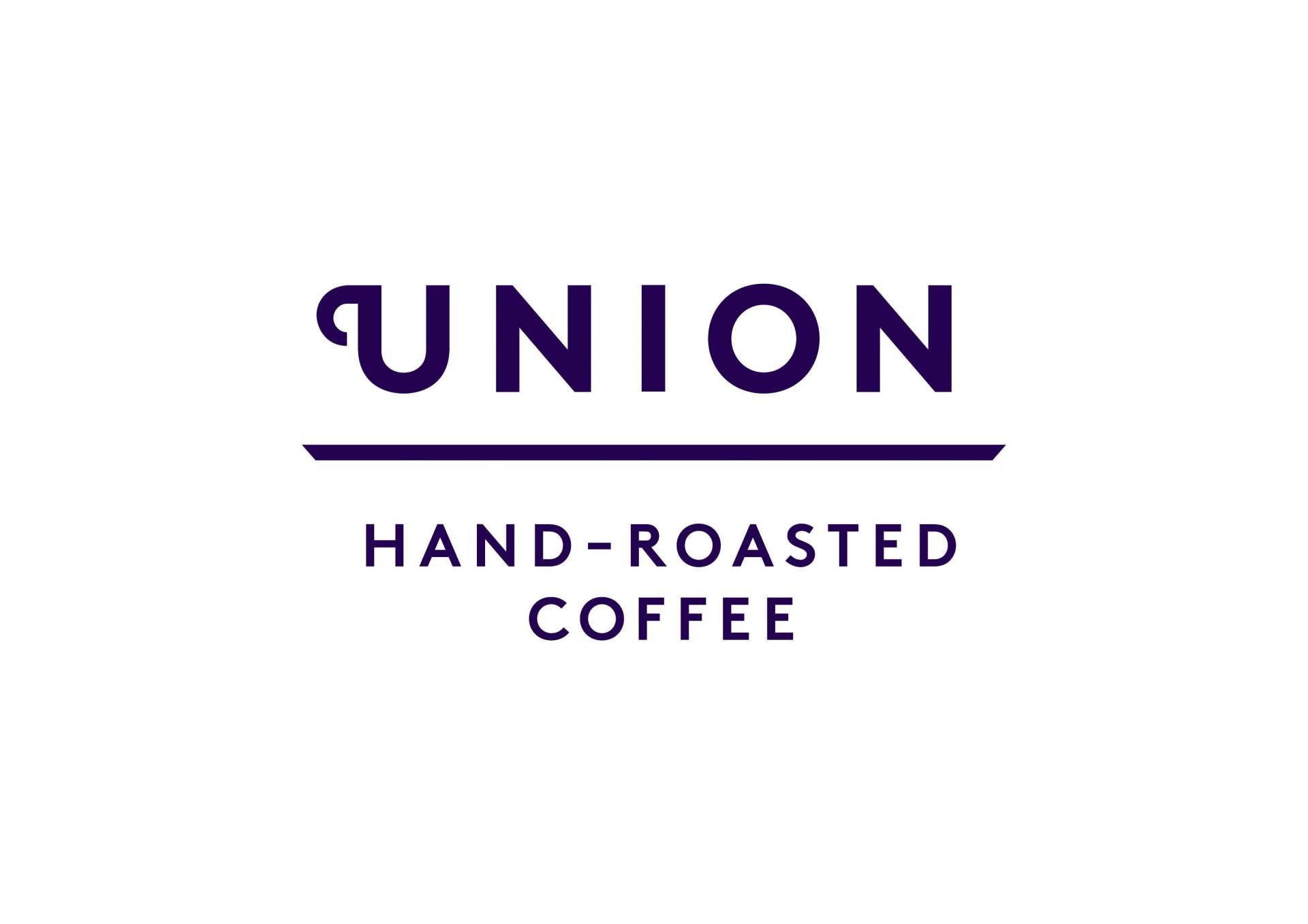
Union Hand Roasted Coffee 
Union stands for better coffee for everyone from bean to cup. We're pioneers in two things which we have a relentless focus on: roasting delicious fresh coffee and ethical sourcing.
 Online
Online
 UK Wide
UK Wide
We started Union Coffee in 2001, after years of witnessing the impact of volatile markets on the lives of coffee farmers. We saw how communities suffered from having to accept low prices that did not even cover the cost of producing their coffee. We wanted to create a better way. We wanted to be a force for good.
Union was founded with the aim of encouraging farmers to produce high-quality coffee by paying sustainable prices. The extra income from this trading model would improve the livelihoods of farmers and, we hoped, further encourage them to keep raising the quality of their coffee.
UNION DIRECT TRADE MEANS:
1.You can find out exactly where, how, and by whom your coffee is produced.
2.The farmer receives a fair, sustainable price. Always above minimum Fairtrade price, in 2017 on average over 50 per cent or above.
3.Your coffee comes from farmers committed to sustainable agricultural practices and labour rights.
4.You get access to unique coffees. Through our direct sourcing and long-term relationships, we can discover exclusive, hard-to-find gems.
5.You are guaranteed to drink a delicious cup of 100 per cent Arabica, speciality coffee.
In 2017, we won the Queen’s Award for Enterprise in Sustainable Development, the UK’s highest accolade for business success in sustainability. This year, we are celebrating 20 years of shaping and shaking the speciality coffee world, paving the way for a brighter future for everyone from farm to cup.
What does hand-roasting mean?
Hand-roasting represents our craftsmanship required to create a perfectly roasted batch of coffee, with delicious aroma and flavour. This differs from industrial roasting systems, which are mostly automated, with little human intervention, built to maximise speed, efficiency, and volume.
Our artisan roasting uses sensory skills to monitor changes in colour, aroma, and the physical appearance of the coffee. Our roastmasters are fully engaged throughout the time of the roast to make critical adjustments depending upon the particular coffee. Our craft roasting creates an accurate roast profile (the rate of change of temperature during roasting) which is the key to the consistency of each batch of coffee we roast. From our experience, skilled human intervention is essential for this. Hope this helps, and you can read more here
If you'd like to know more about our roasting, follow this link:
https://unionroasted.com/pages/our-roasting
How are your 'flavour notes' created?
Our 'flavour notes' are the taste flavours in the brew that remind us of particular fruits or food items.
Our team of coffee tasters are passionate about memorising all types of flavours they encounter daily and are trained to recognise them in coffee.
What is the difference between a House Blend, a Single Origin and a Microlot?
Blends are developed by our coffee team by mixing different Single Origin coffees to create a unique and delicious flavour profile that we want to make available either all year round or for a particular season.
For instance, when we designed our House Roast, we wanted a rich and balanced blend with deep flavours and a delicious underlying sweetness so we selected a full-bodied and chocolatey coffee from Peru that we blended with a small proportion of sweet and fruity Colombia beans.
Single Origin coffees come from a specific area or region, often a family-owned estate farm or a cooperative of smallholder farmers who join forces and transport their crops to a central facility to create a bigger lot. This is an efficient way to facilitate export for smallholders and to also maintain quality and flavour consistency from season to season.
Microlots are coffee lots that have been selected and separated from the bulk of the crop because of a unique or distinctive characteristic(s). It could be for instance a higher quality score, a specific processing technique or simply a different flavour profile.
What is the correct grind size to choose for my brew method?
Pick Wholebean if you have a grinder or a bean to cup machine.
Pick Cafetiere Grind for a Cafetiere or French press.
Pick Filter Grind for any filter method including V60, Chemez, Filter Machine, Aeropress and Stovetop / Moka pot, or any pour over method.
Pick Espresso Grind for an Espresso Machine only.
Why aren't all your coffees organic certified?
We source our coffee through Union Direct Trade, this is our sustainability initiative which is defined by our Union Code of Conduct. The Code sets clear environmental expectations. We expect all farms we source from to apply sustainable production systems, for example, shade-grown coffee which promotes biodiversity, composting, terracing to manage soil erosion, and pest control through integrated pest management using biological control systems.
These methods reduce or eliminate chemical applications, for example, synthetic fertilizer or pesticides. High-altitude grown coffee that we source are not exposed to pests in the way lower-altitude, commodity-grade coffees are. At warmer temperatures, pests are more active which requires more intensive intervention with pesticide chemicals. We routinely screen our coffees for pesticide residue, at a specialist laboratory, and this is always undetectable.
Organic coffee is grown without synthetic inputs such as chemical pesticides or synthetic fertilizer. In places like Ethiopia and Indonesia, farmers do not use these synthetic inputs, either because they are not available, or to reduce costs. These farmers use organic production systems but may not be certified to avoid the extra administration and high costs associated with this.
Organic certification guarantees that the production process has been audited by an independent organisation and achieves compliance. Furthermore, at our roastery, we are inspected annually by the Soil Association to ensure we maintain the organic status during roasting and packaging.
What does Q score mean?
Q (Quality) scores are the internationally-recognised way of representing coffee quality: the better the coffee, the higher the score.
Professional coffee tasters train with the Coffee Quality Institute before taking a full week of exams at the end of which, if they pass all of them, will earn a certification that sanctions their ability to taste and evaluate coffee.
At Union, every person who has the responsibility of assessing and selecting coffee has successfully been through the Coffee Quality Institute course.
Why is it important for coffee to be fresh? What is the optimal time to use the coffee?
Coffee freshness is important because coffee loses its qualities overtime at contact with oxygen and humidity, which is why we recommend you to store your coffee in a tight and sealed container once it is open.
Because of the minuscule particle size, pre-ground coffee is much more exposed to this staling process and will start losing its quality and taste within a few days. We flush the bags with nitrogen to force the oxygen out and prevent oxidation- however, once the bag seal is opened, the coffee will be exposed to air again and should be used quickly!
On the other hand, coffee can also be too fresh. It may sound odd that coffee can be too fresh, but the roasting process creates carbon dioxide inside the beans which takes several days to slowly escape. This carbon dioxide creates microscopic gas pockets which prevents the brewing water from fully extracting the flavours and this effect is magnified by the high pressure espresso machines apply to the coffee.
We recommend for Wholebean...
Ideally, no more than two weeks and certainly no longer than a month, and dependent on your brew method:
For Espresso: From ten days to a month (max)
For Filter: From four days to three weeks
We recommend for Pre-ground...
As soon as possible once open, no longer than two weeks.
For more tips on storage and getting the best out of your beans, visit this page:
https://unionroasted.com/pages/storing-your-coffee
How do I keep my coffee fresh?
There are several opinions in the coffee industry around storing coffee at home. As a reminder, here is our view on the matter:
Fresh air is coffee's greatest enemy. Oxygen and moisture within the air are quickly absorbed by the roasted beans, at the expense of their inherently delicious flavours.
When a bag is opened, in general, Wholebean coffee begins to lose its flavour when left out after one week, while Ground coffee can do so within an hour of opening. If you are using Wholebean coffees, store them in their bags at room temperature and out of direct sunlight.
Never store your coffee in the fridge – not even in an air-tight container. Fresh roasted coffee is incredibly hygroscopic, and will quickly absorb odours in the air. A fridge normally contains strong aromas, which will then be transferred to your cup.
The best way to store coffee is in the freezer. This is because the inert environment will help to lock in the fine flavours over a much longer period of time. This method of storage is especially recommended if you are a low volume user of fresh, ground coffee.
When taking coffee out for brewing after freezing it, always ensures that you take out only as little as is needed, and return the rest of the pack back to the freezer, immediately. This is because if kept out for longer periods of time, condensation will form on the grounds, and thus destroy the flavours – particularly if this water is then re-frozen. Coffee does not like frequent and extreme changes in temperature.
Having said all that – the best way is to drink your coffee quickly while it’s fresh!
How do I know what size to grind my coffee into?
As a general rule, the shorter the contact time between water and coffee, the finer the grind size:
Espresso: ~25 seconds of contact time = very fine grind
Cafetiere: ~4-minute brew = coarse grind
Then, if your coffee tastes too acidic and watery, making it finer will help- too bitter and gritty, coarser you should go.
For more information on grind sizes and types of grinders visit this page:
https://unionroasted.com/pages/brewing-equipment
What is your decaffeination process?
We use the CO2 process. This means only ingredients used in our decaffeination process are water and carbon dioxide.
Water steam is passed through the unroasted coffee beans to open their pores. Liquid CO2 is poured onto the beans and (Carbon Dioxide) is then pumped into an “evaporator” where it is turned back into a gas. This is where the caffeine is separated. It will then be re-pressurised into its liquid form and re-introduced into the coffee beans. This is a slow process that goes on until virtually all caffeine has been removed from the seeds- this can take up to four days!
If you'd like to understand more, we have a blog post you may like to read here:
https://unionroasted.com/blogs/latest/unravelling-the-decaffeination-mystery-organic-co2-process
Why are some coffees recommended as espresso and others as filter?
In our experience, some coffees have natural characteristics that make them more suitable for one brewing method than another. We have tremendous respect and admiration for the hard work that coffee growers put into their craft, and avoid insisting on a specific brewing method for a particular coffee; we’d prefer to use the brewing technique that reveals the best expression of flavour.
As a rule of thumb, espresso machines will make your cup more intense and acidic than filter brews so we tend to choose balanced coffees with low acidity. On the other hand filter coffees can bring out clearer and more distinguishable flavours, so we tend to place complexity and sweetness over perfect balance. These attributes are not set in stone for us but are helpful guidelines. There are indeed exceptions, and sometimes some coffees work very well for different brewing methods.
Are your coffee bags and packaging recyclable?
Our coffee bags are constructed from paper/aluminium/PET/PE to keep the coffee fresh. It is only recyclable in some boroughs/councils due to the mix of materials that need to be separated to be recycled.
While we cannot compromise the freshness of the coffee, we are working on fully recyclable solutions. All our paper materials are FSC and recyclable (including the box around the retail packs, and all leaflets, corrugates and outer packaging).
Rate us and Write a Review
Any events hosted by this company are listed here.

